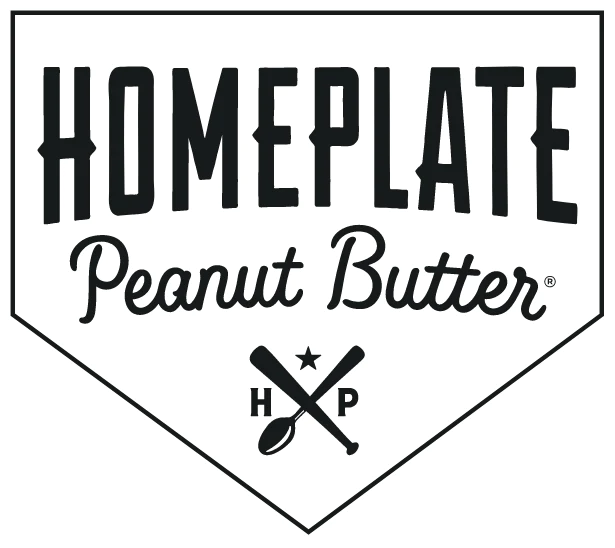Frequently Asked Questions
NUTRITION
Is HomePlate Non-GMO Project Verified?
HomePlate Peanut Butter Creamy & Crunchy products are Non-GMO verified. Our Honey Peanut Butter products are not Non-GMO verified because we can not control where the bees polinate.
Does HomePlate Peanut Butter contain hydrogenated vegetable oil?
No, HomePlate Peanut Butter does not use hydrogenated vegetable oils. As an alternative we use RSPO certified, sustainably sourced palm fruit oil.
Is HomePlate Peanut Butter Gluten Free?
Yes, HomePlate Peanut Butter is naturally gluten free, however we are not certified gluten free.
How long can I keep HomePlate Peanut Butter on the shelf?
You can store HomePlate Peanut Butter in a cool, dry place until the expiration date printed on the jar or packet.
Do I have to refrigerate HomePlate Peanut Butter?
Nope!
Should I be concerned with any food allergies related to HomePlate Peanut Butters?
People with allergies or sensitivity to peanuts or honey should not eat HomePlate Peanut Butter.
SHOPPING
What sizes is HomePlate Peanut Butter Available in?
We currently sell in 16oz jars and single serving squeeze packs.
Does HomePlate make other nut butters like almond or cashew?
Nope. Right now our focus is on the magical legume known as the peanut.
What is your return policy?
If you purchased peanut butter on our own site and experienced any issues, please send an email toinfo@homeplatepb.com and we'll be sure to get back to you as soon as we can with a resolution. If you purchased our peanut butter at a retail store, you'll need to reach out to that store to arrange for a return.
INGREDIENTS
All HomePlate Penaut Butter's ingredients sourced sustainably?
Yes, all of HomePlate Peanut Butter’s ingredients are sourced in a sustainable manner.
What exactly is palm fruit oil?
It is oil pressed from the outer orange flesh of the fruit and has a balanced fat profile and contains a host of micronutrients including antioxidants that can have health benefits.
Palm fruit oil is naturally stabilizing, making it a great replacement for hydrogenated oils and emulsifiers used in conventional peanut butter
(Note: Don’t confuse with Palm Kernel Oil from the center that is 85% saturated fat with fewer nutrients.)
What does "RSPO Certified" mean?
RSPO, or the Round Table on Sustainable Palm Oil, is a board of global stakeholders that works to ensure sustainability of palm fruit oil. HomePlate’s RSPO certification means the source of our palm fruit oil has been vetted, and is not produced in a way that is harmful to the environment or wildlife. For more on what this means, click here.
Where does HomePlate source its peanuts?
HomePlate Peanut Butter is made with all natural peanuts grown in the USA.
How does HomePlate Source its honey?
We use real honey (not powder) that is True Source Certified. By being True Source Certified, our honey is guaranteed to be ethically sourced, can be traced to the individual bee keeper, and supports those in the honey industry that have taken a clear stance in support of legal and ethical sourcing.
You can read more about True Source here:
Is your sugar fair trade?
Our sugar is sourced domestically here in the USA. Yes, it is fair trade.
Why do you add sugar to your peanut butter?
Our goal is to taste like the peanut butter we all grew up eating, but to do so using clean, high quality, sustainably sourced ingredients. By adding a touch of real cane sugar it brings out the rich flavor of a classic peanut butter.
Other HomePlate Questions
Why do your labels say "peanut butter spread" rather than "peanut butter?"
By the FDA standards, "peanut butter" must contain at least 90% peanuts and can include optional ingredients like salt, sugar, and hydrogenated oils, but no alternatives. Our peanut butter contains at least 90% peanuts, salt, and sugar, however we use a healthier oil (not hydrogenated oil), thus we legally can not call ourselves "peanut butter", we must be called "peanut butter spread". Crazy...right?
What is baseball's connection to peanut butter?
Our founders, like many other players, ate a ton of peanut butter while playing on Minor League teams. They made minimum wage (sometimes even less) and were full time athletes. They turned to peanut butter as an inexpensive and nutritious way to stay fueled. Peanut butter became their go-to source of healthy calories packed with protein. But, they were sick of choosing between healthy and delicious, they wanted both. Thus, HomePlate was born.
What is the meaning behind your name "HomePlate?"
The name "HomePlate" is a nod to our baseball roots, but the name also evokes childhood memories of enjoying a peanut butter and jelly sandwich, made with love and served on your "plate at home". Ironically, what does our logo look like when you flip it upside down? The baseball home plate turns into a home. Coincidence? ;)
Can I eat HomePlate peanut butter by itself?
Yes, we do that all of the time.
Can I eat HomePlate peanut butter on a sandwich?
Yes, but you'll need to purchase bread.
Is there such thing as too much peanut butter?
Probably, but we haven't yet figured out what that limit might be.

